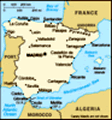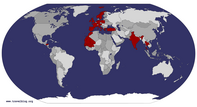Advertisement
Published: April 23rd 2007
The persisting rain hits the surface of the ocean creating a cinemascope strafing effect. The sea as screen, the ‘Meteor' deck as audience, mother nature taking care of the projection. Five weeks into my very first experience as seaman and the ‘Meteor’ stays moored, sheltered from winds and storms, at Saint Catalina wharf, Las Palmas de Gran Canaria. After more than two months of pure wandering, five consecutive weeks sleeping under the same roof seem as long as an entire geologic age. We’re talking about a period long enough to allow the apparition of the first, unavoidable routines.
Officially, my role on board is english-spanish (and vice versa) interpreter between the Melville family, owner of the boat (a 35 meters long hydrofoil built in Ukraine) and Salvador 'Salva', the Chilean engineer employed a few weeks before my arrival in order to prepare the ‘Meteor’ for the Atlantic crossing with final destination the western coast of Mexico. In reality, I do a bit of everything from cooking to painting to taking care of refuelling. Even so, I spend most part of the day reading on deck (in the specific case, on one of the wings), visiting the inside of the
old, fascinating, wooden vessels which often berth at our same wharf, or just wandering around town.
Those days really dedicated to working inside the engines room are the worst. On one hand, I’ve never nourished any interest for motors and the likes, on the other, it’s a matter of working in a narrow, dark and uncomfortable place, centuries away from the precious solar light and in continuous contact, instead, with a mix of sea water, oil and diesel omnipresent in the bilge. When it comes to cranks, screwdrivers and valves, my knowledge is very limited, to say the least. And my vocabulary in the field is proportionally modest, in english as in spanish as in my own mother tongue. Salva and Pat (the boss) often understand each other before I, neophyte, have the chance to understand what I should in effects translate.
But there are, in the daily routine of my interpreter days, other situations, much more interesting than that one just mentioned. One is the search for second hand spare parts. There is inside the port, in a rather remote area, and well sheltered from the looks of ‘respectable’ people, the sea junk wharf. Fishing boats and
other vessels of considerable size, usually of Russian or Chinese nationality, abandoned to a destiny of rust and oblivion from the (il)legal intersection between shipowner’s lack of morality and potholed laws. Dozens of ships waiting for being sent either to dry dock by the judge or to the bottom of the sea by the mafia. The shocking thing is that rats are not the only souls living on such vessels. The ill-fated members of what was the crew in the last journey still live onboard. In the economic impossibility to return to their countries, deprived of a regular permission to legally work in Europe and in the always vain hope that shipowner ‘papa’ will finally come and rescue them, hundred of sailors scratch a living by illegally selling parts of the ship itself to purchasers keen to turn a blind eye on ecological/fiscal/safety rules. As like my employer, for example.
As it always happens, necessity sharpens talent and these world forgotten men knows that their very survival depends on how compact they manage to hold the ranks. In these ghost stores, you only need to start the rumour of what you need and, just like on Amazon or E-Bay,
with a single click you’ll have the goods home delivered next day. Only difference: here you must pay cash.
In all of my ‘hunting’ excursions I’ve been accompanied by Salva, a seaman like themselves. Some kind of blood tie must links the sailors of the world that makes them different from us, ‘earthmen’ but -in a way- siblings among themselves. I’m sure that without Salva, neither I nor Pat would have ever been admitted on their ships, nor would we have known of the existence of such black market. Living conditions on board are characterized by a lodging shared with rats as big as cats and cockroaches the size of mice, a few rags spread on deck to dry in sunlight but looking rather like white flags hoisted after a lost battle, and countless cheap tetra-pack wine scattered all around. But, in such desolating panorama, it’s the presence of TV and DVD sets to catch my attention. They seem to be there to say: ”If we have a TV we are not doing that bad…”.
Other situations interesting to translate are the red-hot arguments between the boss and Salva. The first one looks like Popeye but for the
rest is an American businessman who has invested several hundreds thousands dollars in this risky plan and which only target is to get a neat profit from the operation. Apart from this, it’s an untiring and meticulous worker. Salva, instead, presents the peaceful aspect of the fat middle aged man who has just swallowed a whole watermelon, but in the deep he is a true seaman. If your stereotype of seaman is equivalent to mine, you have already an idea of what my good friend Salva is: a lover of alcohol, sea, ports, prostitutes and fighting. Crashes between the two are continuous, dog and cat alike, amplified by the frustration of not having a common language trough which being able to freely jump at each other throats.
The quarrels between the two, having to be translated by me, turn out to be surrealistic scenes. They appear in two different types: a) the one barking straight on the snout of the other and the second one turning to me asking for enlightenment; b)the first one angrily yelling at the other but facing me (and even pointing at me meaning to point at the other). In the first case, the most
ignited arguments, I usually just smooth roughness in translation and use circumlocutions where there were insults or the like. As for the second, I’m still not sure whether I should myself raise index finger and voice tone in order to render the translation as faithful to the original as it comes.
Natacha, a Russian friend who is helping me out (euphemism: she does it all) with the translation of some documents of the ship, works for a Lithuanian shipping company here in Las Palmas, living consequently in continuous contact with seaman returning after months spent working out at sea. In her words the resume of the character of these lonely yet loyal people: “They come back in town after two months at sea, walk into the office and receive a consistent check, 3, 4, 5 thousands dollars, they stay here only for a week, sometimes even less than that and -you won’t believe it- in these few days many of them succeed in burning nearly the whole pay check earned working as hard as mules during two months at sea. Some of them even come back to the office a few days later with the usual story of having
being robbed and ask for an advance payment on the next wage so to have enough funds to buy a homebound plane ticket!”.
After becoming acquainted with Salva, I actually find this sort of stories absolutely reasonable. In the five weeks since I first met him, he didn’t show up at work twice because of colossal drunkenness the nights before, has fallen in a trap door in the hold (left uncautiously open by himself) resulting in a strained shoulder, has recovered in no time from such injury, has quarrelled endless times with the boss, has been arrested for violent behaviour and last, once released by the police, has been put at the door by her wife (yes, he used to have a wife and a house here in Las Palmas) ending up moving definitively on the ‘Meteor’. All this, I repeat it, has happened in the short turn of 35 days!
Listening to his anecdotes from 20 years of sea life and seeing him in action, my mind flies to Jack London’s words: “The truly aim of men is to live, not to exist. I will not waste my days trying to extend them. I will use my time”. Salva, paradigm of all the seamen, uses its time. Perhaps, he sometimes uses it the wrong way, but surely enough he doesn’t just keep breathing in behalf on an hypothetical future.
ITALIANO La versione italiana di questo blog la trovi sul sito Vagabondo.net
Link:
Vita di un Marinaio
Advertisement
Tot: 0.099s; Tpl: 0.014s; cc: 10; qc: 28; dbt: 0.0495s; 1; m:domysql w:travelblog (10.17.0.13); sld: 1;
; mem: 1.1mb














johan
non-member comment
excellent writing!
ciao Marco, how are you? i am so jealous about your skills in which you portray the daily events with the character Salva and the "black-market-ships". Maybe you want to help me out with writing my novel? Since you visited sweden i have put many different small ideas together, and it is shaping out to become a good plot and script for a book... The best of luck on your journey across Atlantic, I can't wait to read your next story (from Mexico?) Johan ( www.precis.to/johan )